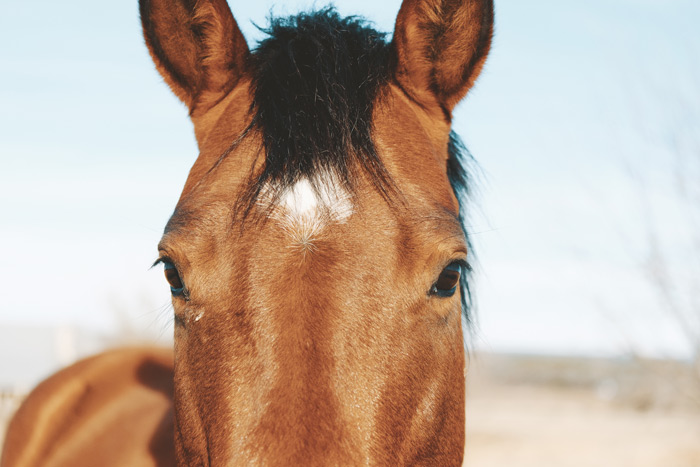What Is Equine Therapy?
When you first hear the term “equine therapy,” it may be hard to suss out just what it means. Is it therapy for horses? Are the horses the therapists? And if so, are we talking about a Mr. Ed sort of situation?
The answers to these questions are: no; in a way; and decidedly not.
Chelsea Wire Explains
“There are different types of equine therapy,” says Chelsea Wire, a licensed professional counselor (LPC) and Eagala certified therapist. “What we are doing at The Aviary is equine-assisted psychotherapy that’s ground-based. There’s a saying, ‘You can’t look in the mirror if you’re sitting on it.’ If you’re riding the horse, you might be more focused on skills—‘Am I doing this right?’—versus being on the ground, present with the horse and allowing them to reflect back to you what your emotions are.”
As an example, she describes a situation in which one horse nips at another. The people in therapy are then encouraged to connect what they have seen with their own personal story.
“They may be able to say, ‘This one reminds me of this person in my life,’ or maybe, ‘I realize that maybe in my own life, I lash out, cross boundaries, and don’t communicate well,’” Wire explains. “People will be able to translate different themes from what they’re noticing about the horses back to their own lives.”
Making Connections
Wire notes that the connections the clients see are wholly their own.
“It’s not something that we feed to them, by any means. It’s more like, ‘What do you think is going on?’ And it’s not about having the right answer about what’s going on in terms of horse behavior; it’s more about what the person thinks is going on and how they are interpreting it and relating it back to their own life.”
This process is closely aligned with cognitive behavioral therapy and its focus on thoughts, emotions, and behaviors. “We can explore things like, ‘What does this look like in regards to your emotional response? And what do you want to do in response to your emotions?’” Wire explains.
Wire is The Aviary’s only equine therapist, and she works with two equine specialists (a fancy way of saying these are true “horse people”) in rotation. “They need to be very familiar with horse behavior in regard to safety so I can be focused on human behavior with regard to safety. It’s a team approach, which helps us notice a little more and hold each other accountable, too.”
About Our Horses
And what about the horses? Are they licensed therapists? Well, not exactly. But they are carefully screened.
“In our program at The Aviary, we do have two horses to help create a dynamic of relationship,” Wire said. “They are rescue horses, and they did have to go through their own interview process, so to speak. They wanted to make sure these were horses that don’t spook easily and could tolerate lots of people having hands on them at once. You want to be sure that they are able to tolerate being walked behind without getting too jumpy. The horses we chose are middle aged to a little later in life so they are a lot more naturally calm.”
Because The Aviary’s equine therapy program does not include a riding element, it was also important to find horses that would not expect to be ridden.
“The rescue called them pasture pets. So that meant that we didn’t have to keep riding them and that they understand that their job is to be present with these people in this way.”
The horses live on the grounds of The Aviary, which has a barn and a pasture on the property. An indoor arena is being built as well. Wire and The Aviary’s equine specialists feed and care for the horses throughout the week, while on the weekends some of the recovery center’s extended care clients handle the feeding and chores.
About Equine-assisted Psychotherapy
When it comes to the therapy itself, once a week, clients come to the equine center with those in their group therapy community. But even in this group setting, the activity can be personalized. Take, for example, an individual who might have a fear of the horses.
Wire described the journey of a recent client who started by observing from outside the fence. At the next session, they came inside the fence but sat in a chair. The next week, they approached a horse with one of their peers close by their side. “And then right before they were going to complete the program, they went up to the horse a couple different times and had hands on. It was all them. It was whatever they were ready to do. Everyone is coming with their own experience.”
According to Wire, many clients report a sense of calm in the presence of the horses whether or not they are comfortable interacting with them directly. And that sense of peace can be of great value to those who are struggling to rebuild their lives and build a foundation for lasting sobriety and mental well-being. And for those for whom this kind of therapy seems particularly useful, The Aviary can make referrals to other providers who can offer these sorts of experiences once a person’s time in residential treatment has come to an end.
Our Horses Are Here to Help
Equine-assisted psychotherapy is just one of the many resources The Aviary Recovery Center has to help you overcome a substance use disorder and start your recovery journey on firm footing. The humans—and the horses—of The Aviary are ready to help you reclaim your sobriety and rebuild your life.










